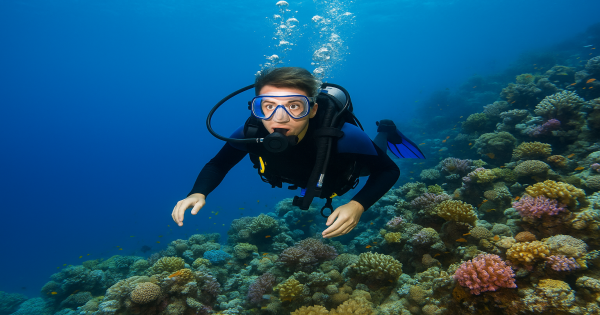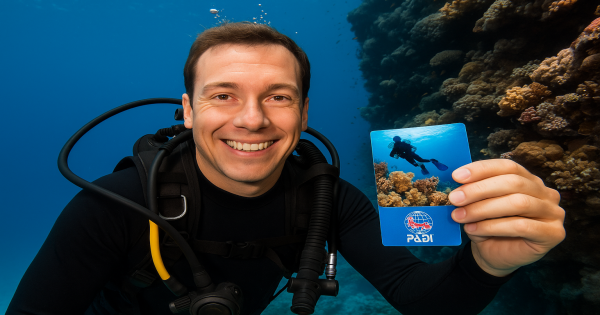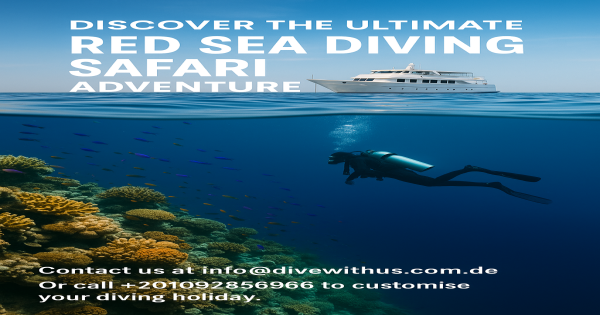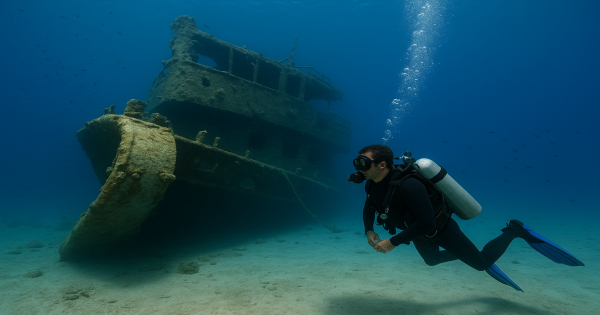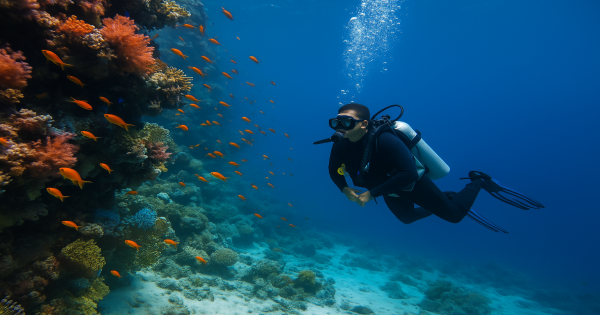Blog Details
Freshwater diving vs saltwater diving
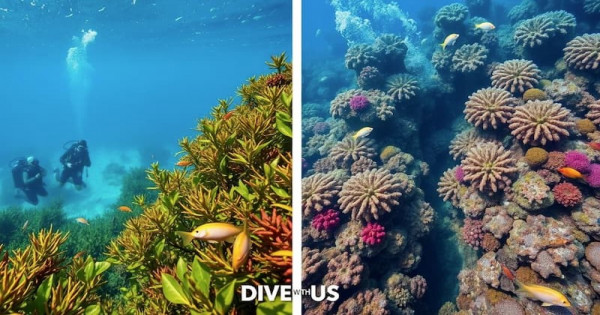
Many diving fans know about freshwater and saltwater diving. Each type has its own unique challenges and joys. Knowing the differences is key for a safe and fun dive. Let's dive into what makes each type special.
The main differences aren't just about the water type. They also affect your gear, how clear the water is, and the creatures you'll see. It's important to know these differences to be ready for your dive. Whether you prefer freshwater or saltwater diving depends on what you're looking for.
Key Takeaways
- Freshwater diving and saltwater diving offer unique experiences and challenges.
- Understanding the differences between freshwater and saltwater diving is crucial for a safe dive.
- The comparison of freshwater and saltwater diving reveals distinct opportunities for exploration.
- Freshwater diving vs saltwater diving depends on the diver's preferences and goals.
- The equipment and techniques used in freshwater and saltwater diving differ.
- Visibility and marine life vary significantly between freshwater and saltwater diving.
Understanding the Basics of Freshwater and Saltwater Diving
Freshwater diving and saltwater diving are two different diving experiences. Freshwater diving is easier to access because many lakes and rivers are near cities. Saltwater diving, on the other hand, offers a chance to see more marine life and ecosystems.
Saltwater diving is known for its variety of marine life and coral reefs. However, it requires different equipment and techniques. Freshwater diving needs less gear and is less tiring. Saltwater diving, though, needs special gear to handle saltwater's corrosive effects.
What Defines Freshwater Diving
Freshwater diving happens in lakes, rivers, and other low-salinity waters. It's known for limited visibility and less marine life. But, it's less demanding and needs less equipment.
What Constitutes Saltwater Diving
Saltwater diving takes place in oceans and seas with high salinity. It offers a wide range of marine life and ecosystems. But, it's more demanding and requires special gear.
Key Chemical Differences Between Water Types
The chemical differences between freshwater and saltwater are crucial for divers. Saltwater is more corrosive, affecting diving gear. Saltwater's higher density also changes buoyancy, needing adjustments in equipment.
Knowing the basics of freshwater and saltwater diving is key for any diver. By understanding the benefits of each, divers can choose the best diving experience for them.
Buoyancy Differences: How Water Type Affects Your Dive
Diving in different waters requires knowing how buoyancy works. Freshwater diving tips tell you to add weight because freshwater is less dense. But, saltwater diving techniques need less weight because saltwater is denser.
The density of water is key for buoyancy. Saltwater is about 3.5% denser than freshwater. This means you might need less weight in saltwater. Here are some important points to remember:
- Freshwater: Add weight to achieve neutral buoyancy
- Saltwater: Use less weight due to the higher density of the water
Knowing these differences helps divers stay safe and enjoy their dives. By using the right freshwater diving tips and saltwater diving techniques
Equi pment Considerations for Different Water Environments
pment Considerations for Different Water Environments
Choosing the right diving gear is key. Whether you're diving in freshwater or saltwater, the right equipment is vital. Freshwater diving might need less gear, but you still have to think about water temperature and visibility.
Saltwater diving, on the other hand, requires more specialized gear. This includes wetsuits and dive computers to fight off saltwater damage. Keeping your gear in top shape is also crucial for safety and performance. Here are some important equipment tips for different water types:
Specialized Gear for Saltwater Diving
- Wetsuits or dive skins to protect against saltwater corrosion
- Dive computers to track depth and time
- Regulators and BCDs designed for saltwater use
Essential Equipment for Freshwater Diving
- Mask, snorkel, and fins for comfortable diving
- Dive light to illuminate dark waters
- First aid kit and emergency equipment
Maintenance Requirements by Water Type
Keeping your gear in good shape is a must. For freshwater diving, rinse your equipment with fresh water after each dive. Saltwater diving gear needs more cleaning and care to avoid rust.
Marine Life and Ecosystem Variations
When diving, the big difference is the marine life in each place. Saltwater diving lets you see coral reefs and shipwrecks full of life. This shows why saltwater diving is special. Freshwater diving, on the other hand, shows us hidden plants and animals, giving us a new view of nature.
Some key differences in marine life include:
- Coral reefs, found in saltwater, are home to many marine creatures
- Freshwater fish like trout and bass live in rivers and lakes
- Seaweed and kelp grow in both salt and freshwater
Knowing about each environment helps us understand marine life better. By looking at freshwater diving vs saltwater diving, we learn to love and protect nature more.
In summary, the differences in marine life make each dive special. By seeing the advantages of saltwater diving and the unique things about freshwater, we can better enjoy and protect marine life.
Visibility Factors in Freshwater Diving vs Saltwater Diving
Visibility is key when diving. It can change a dive from good to great. In both fresh and saltwater, many things can affect how clear the water is. For example, freshwater diving tips tell divers to watch out for sediment and algae, which cloud the water.
Saltwater diving techniques remind divers to consider currents and marine life. These can also mess with visibility. Let's dive into what affects visibility in both types of diving.
Understanding Water Clarity
Water clarity is super important for seeing underwater. Freshwater usually has less clear water because of sediment and algae. Saltwater, however, is clearer but can get cloudy from strong currents and marine life.
Temperature Effects on Visibility
Temperature also matters for visibility. In freshwater, temperature changes can stir up sediment, making it harder to see. In saltwater, temperature changes can affect marine life growth, which can also cloud the water.
Seasonal Considerations
Seasonal changes can also mess with visibility. For instance, spring runoff in freshwater can cloud the water. In saltwater, changes in currents and marine life can also affect how clear it is.
By knowing these factors and adjusting their diving, divers can have a better experience. Whether in freshwater or saltwater, being aware of the unique challenges is key. By following freshwater diving tips and saltwater diving techniques, divers can ensure a safe and fun dive.
Popular Destinations for Both Types of Diving
For freshwater diving, many best places for freshwater diving are found worldwide. Some top spots include:
- Lake Tahoe, known for its crystal-clear waters and scenic surroundings
- Florida Springs, featuring an array of freshwater springs and underwater caverns
- The Great Lakes, offering a diverse range of freshwater diving experiences
On the other hand, saltwater diving fans have the top saltwater diving destinations like the Great Barrier Reef, the Red Sea, and the Caribbean. These places are home to a vast variety of marine life, perfect for saltwater diving adventures.
Whether you love freshwater diving or saltwater diving, there's a place for everyone. Each spot offers a unique and memorable experience. With proper training and gear, you can dive into the world's most stunning underwater spots, from the best places for freshwater diving to the top saltwater diving destinations.
Safety Considerations and Best Practices
When diving, safety is always first. Knowing the freshwater diving vs saltwater diving differences is key. It helps divers make smart choices and stay safe. Each diving type has its own risks and challenges.
Depth Limitations
Depth is a big safety factor. Divers need to know their limits and their gear's limits. This avoids accidents. Even in freshwater diving, following safe practices is crucial.
Emergency Procedures
Knowing how to act in emergencies is vital. Divers should have a plan for things like equipment failure or health issues. It's also important to understand the differences between freshwater and saltwater diving in emergencies.
Some key safety tips include:
- Always dive with a buddy
- Monitor weather conditions
- Follow safe diving practices
Training Requirements and Certifications
To become a good diver, you need proper training and the right certifications. Freshwater and saltwater diving are different. You should get training and certifications for each type.
For freshwater diving tips, learn about navigation, staying buoyant, and emergency steps. For saltwater diving techniques, study marine life, currents, and saltwater gear handling.
Some important certifications include:
- Open Water Diver certification
- Advanced Open Water Diver certification
- Specialty certifications, such as wreck diving or deep diving
Get these certifications from trusted places like PADI or NAUI. Following freshwater diving tips and saltwater diving techniques will make your dives safe and fun.
Remember, getting the right training and certification is key for a safe dive. Whether in freshwater or saltwater, having the right skills is crucial.
Conclusion: Choosing Your Ideal Diving Environment
The world of diving is split into two exciting worlds: freshwater and saltwater. Each has its own challenges and rewards. Your choice depends on what you want from your diving experience.
If you love exploring colorful marine life, saltwater diving is for you. On the other hand, freshwater diving offers calm waters and fascinating underwater landscapes.
Whether you prefer freshwater or saltwater, both offer amazing chances to discover the underwater world. Knowing the differences helps you choose the right path for your next diving adventure.
FAQ
What defines freshwater diving?
Freshwater diving happens in lakes, rivers, and other low-salinity bodies of water.
What constitutes saltwater diving?
Saltwater diving takes place in oceans and seas with high salinity levels.
How do the chemical differences between freshwater and saltwater affect diving?
The chemical differences between freshwater and saltwater affect divers a lot. Freshwater diving needs less equipment and is less tiring. Saltwater diving, on the other hand, offers a chance to see more marine life and ecosystems.
How does water type affect buoyancy and diving techniques?
The density of freshwater and saltwater changes how buoyant divers are. In freshwater, divers might need to add weight. In saltwater, they might need less weight because the water is denser. Knowing these differences is key for safe diving.
What specialized gear is required for saltwater diving?
Saltwater diving needs special gear like wetsuits and dive computers. This is to protect against saltwater's corrosive effects.
What essential equipment is needed for freshwater diving?
Freshwater diving might need less gear, but divers still have to think about water temperature and visibility. These factors help choose the right gear.
How does regular maintenance differ for equipment used in freshwater vs. saltwater?
Keeping equipment in good shape is crucial for safety and performance. The needs can vary based on the water type.
What types of marine life and ecosystems can be found in freshwater and saltwater environments?
Both freshwater and saltwater have a wide range of marine life. Saltwater diving lets you see coral reefs and shipwrecks. Freshwater diving reveals unique plants and animals.
What factors affect visibility in freshwater and saltwater diving?
Clarity, temperature, and seasonal changes affect visibility. Divers need to understand these factors and adjust their techniques. In freshwater, sediment and algae can reduce visibility. In saltwater, currents and marine life can do the same.
What are some popular destinations for freshwater and saltwater diving?
There are many great places for diving worldwide. For freshwater, try Lake Tahoe or the Florida Springs. For saltwater, the Great Barrier Reef and the Red Sea are amazing.
What safety considerations and best practices should divers keep in mind for freshwater and saltwater diving?
Safety is the top priority in diving. Divers should know about depth limits, emergency procedures, and weather. This ensures a safe and fun dive.
What training requirements and certifications are needed for freshwater and saltwater diving?
Proper training and certifications are vital for diving. Freshwater and saltwater diving require different skills and knowledge. Divers should get specialized training to be ready for each environment's challenges.
